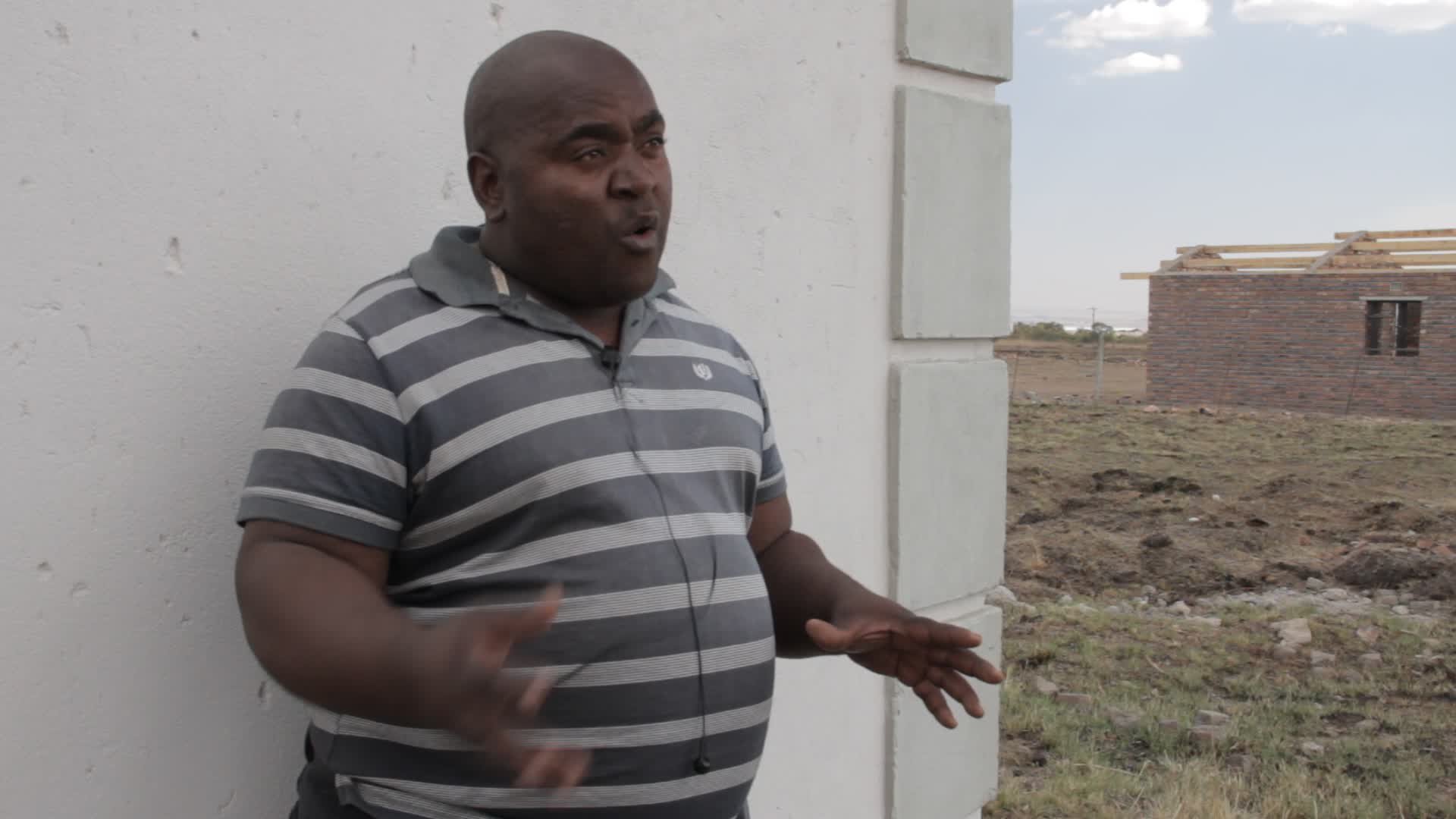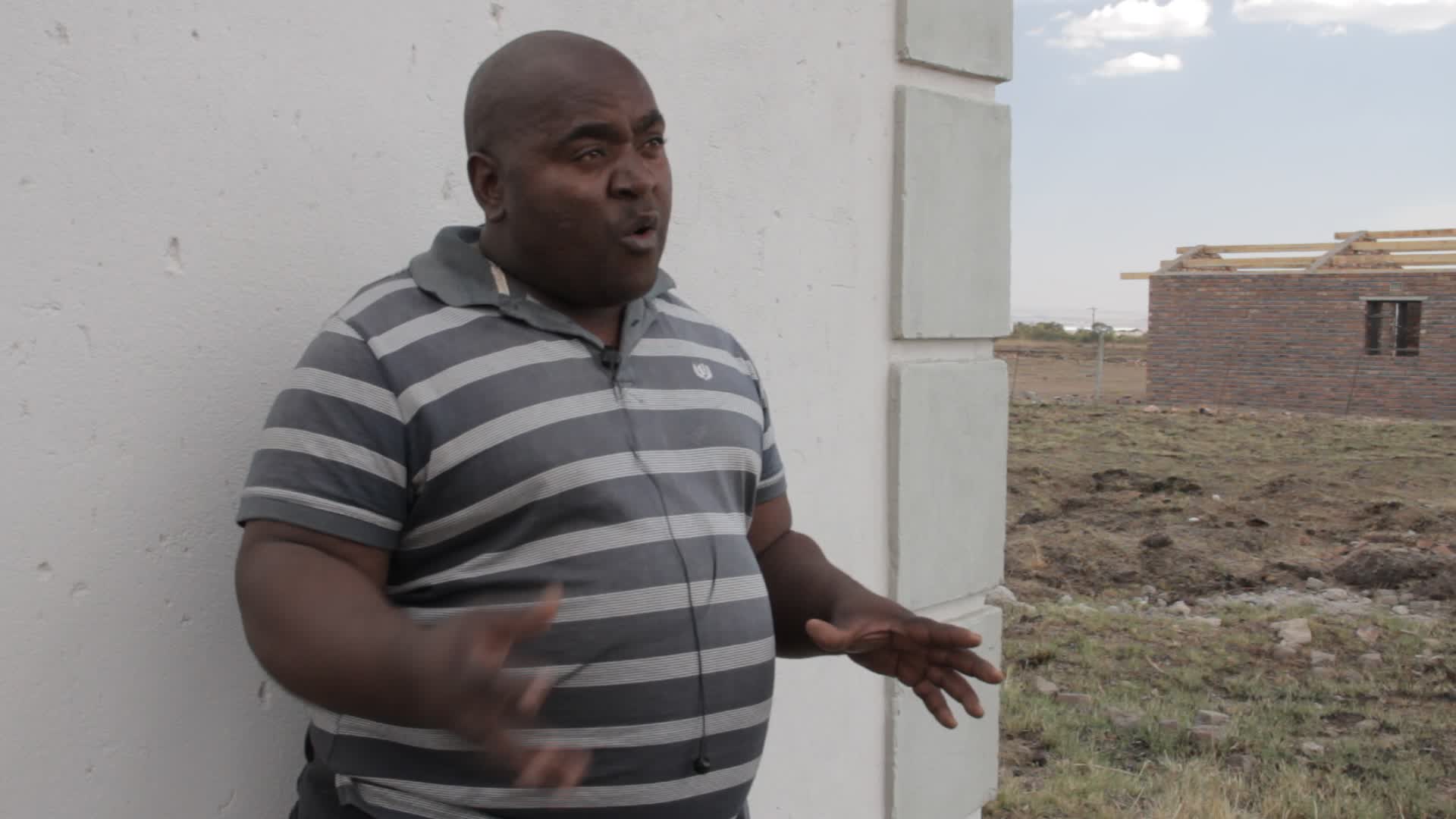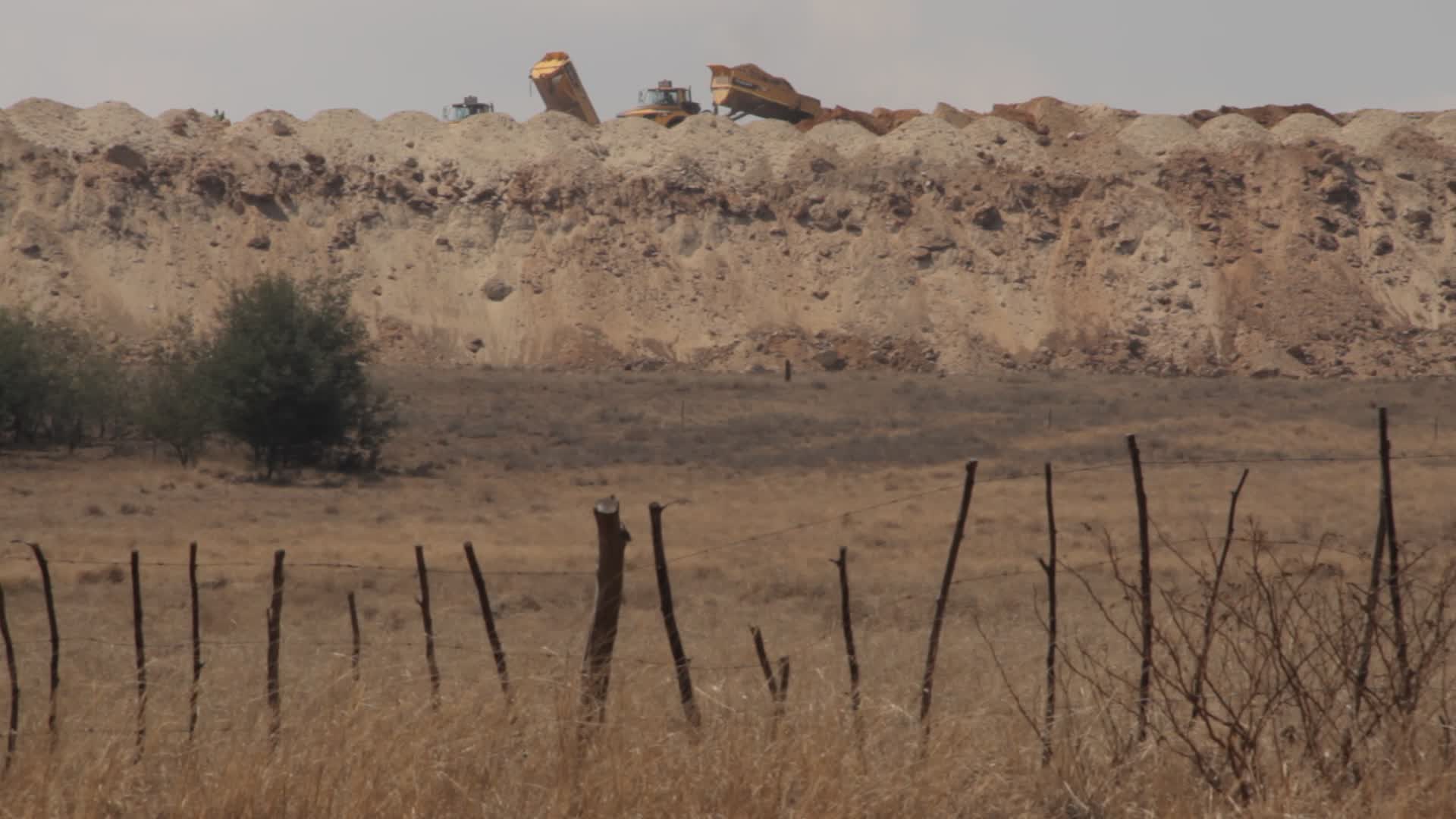
20 Jan Dairy to dust
Opencast coal mining operations in the Mpumalanga Highveld are destroying the livelihood, grazing and water of rural farmers. Franz Fuls visited one affected community near Carolina

Former dairy foreman Lesly Nkosi lost his job after the mine arrived. Photos © Franz Fuls
The villagers of Ebuhleni, near Carolina in Mpumalanga province, are farm workers. They always have been. Until Pembani Coal realised that there are profitable coal seams to be exploited under the farm where the village is located. The villagers have worked on this farm for many decades and, according to the locals, they were also allowed to graze their own cattle on the farm for the past 40 years.
But that’s all over now.
“Before the mine there was a lot of space here, there was a large pasture,” said Lesley Nkosi, a retrenched dairy foreman. “When the mine came, they divided that pasture in half. One side they dug for coal. The people are suffering a lot, and they don’t care how the people make a living. They just do whatever they like.”
Pembani Coal’s operation outside Carolina, about 115km south-east of eMalahleni (formerly Witbank), started in 2004. At the current mining rate of 1.5-million metric tonnes a year, the mine is expected to be operational for about 12 years. The company says it consulted with interested and affected parties. It acknowledges that people living within a 500m radius of the operation are immediately affected and must have preference for jobs.
But since opencast coal mining started on this farm, the lives of the villagers have gradually deteriorated. The mine replaced the previous agricultural business that employed them and today unemployment in the area is rife.
A villager explained that only one resident in the village is employed full time, but by another coal mine east of Pembani’s operation. Yet the company claims to employ local residents first, stating that two individuals from Ebuhleni are employed by the mine. The villagers deny that this is the case.
Tumbling walls
Nkosi is now one of the unemployed. According to him, blasting damaged the brick houses that the villagers lived in and they became structurally unsafe.
Pembani Coal intervened by building them new houses. These houses were built on the exact same place as the old settlement, with active mining operations in close proximity. But the new houses are starting to show signs of damage from blasting.
Fifty-year-old Dan Maseko was born on the farm and lives close to the colliery. During the night of December 18 2013, he woke up to the sound of one of his walls caving in.
According to Maseko, Pembani performed blasting operations at night while his family was asleep in their house and did not evacuate them before blasting. A wall inside his traditional clay home fell down, destroying a couch and some household furniture with an estimated value of R10 000 — a small fortune for him. Fortunately nobody was hurt, but the family was distressed and had to move in with neighbours.
Maseko reported the damage to Pembani the next day, and a company representative was instructed to assess the damage.
Bheki Khumalo, director of Pembani Coal, said the company had inspected Maseko’s house prior to the wall falling down. He said the homestead was 1.8km away from the blasting site and it was hard to believe that any cracks were caused by Pembani’s blasting operations. The damage may rather have been caused by lack of maintenance and high rainfall, he suggested.
Khumalo said Pembani evacuated the Maseko family every time they blasted. “It is unfortunate that the mine cannot afford to build new houses for all people, especially if they are not within the affected area. It would be unfair to put blame on Pembani Coal for any damage to the houses that are outside of the affected radius of 500m from the operations,” he said.
Dry windmill
The villagers struggle to find grazing for their cattle because their former pastures have been dug up. The windmill that used to provide them with a clean water supply has caved in, allegedly because of Pembani’s blasting activities.
Lack of water for cattle is one thing, but the broken windmill also means that nobody has water. The municipality of nearby Carolina town tries to supply the villagers with drinking water on a weekly basis, but cannot keep up and the villagers experience frequent water shortages.
Pembani says the windmill was already broken on their arrival, and that the company tried to repair it but stopped after various failed attempts. According to company representatives, the water yield of the windmill was not enough to sustain the community anyhow.
Backyard dump
The villagers of Ebuhleni are not the only people affected by the Pembani operation. A small subsistence farming collective also borders Pembani’s colliery. According to a resident they were allocated land by the government as part of South Africa’s land reform projects.
Mama Deliwe was one of the beneficiaries. Her home is close to Pembani’s mine dumps, and mining trucks offloading material on the dump are clearly visible from her yard.
Sitting on a bench outside her traditional clay house, she raised her concerns: “The mine never consulted us, they just came in and started mining… It’s a problem because when they blast while you are inside [the house], the roof and the crockery are shaking.
“We are in danger because when they blast the house can fall on us: the cupboards can fall over on to the children while they sleep!”
Soon after the interview with Mama Deliwe, she was relocated to a new home in Ebuhleni village.
According to Nkosi, the former dairy foreman, new houses were being built in the village, though residents had not been informed who would occupy them. It appeared that Pembani was relocating farm workers from other areas where they want to mine, he said.
“So I went and asked them, ‘Why are you bringing more people here, where must the cattle graze?’ They told me people that stay here must keep their cattle inside their yards.”
In response to media inquiries, Pembani Coal’s Khumalo said farm workers living on other parts of the farm were being relocated to Ebuhleni but villagers were still allowed to graze their cattle on the property.
Employment priorities
“The people of Ebuhleni are always given first preference in the employment process at Pembani Coal’s processing plant because it is permanently based in their vicinity,” he said.
Yet Pembani appoints external contractors to run their operations, and they are not bound by this commitment. Khumalo said the contractor operated on more than one farm currently being mined by Pembani, so this could not be enforced.
And since the village is on land leased by the mine from a land owner, Pembani has limited control over permissible activities.
Through a variety of programmes, Pembani has invested close to R20-million in Carolina. These include agricultural initiatives, bursaries, training, construction, social welfare and other initiatives.
But many of the initiatives seem to be aimed at the greater Carolina area, while the people who were previously employed in sustainable agriculture became unemployed as a direct result of the mine.
“It is extremely difficult, almost impossible, to satisfy all quarters of the community around our operation,” Khumalo responded. “Ebuhleni is one of the communities that have benefited from Pembani Coal’s operation, however there are some individuals within the community that believe that they are more entitled to benefit from the company.”
A third of coal produced by Pembani Coal is applied to alleviate South Africa’s energy crisis. The balance is sold to international traders.
#MineAlert: Find out about mining projects near you, and register for alerts, here
Related links:
• Mpumalanga’s ticking time-bomb
• SA’s water bubble
• No (dis)closure on mining’s mess
This investigation by Franz Fuls was supported by the Forum for African Investigative Reporters


